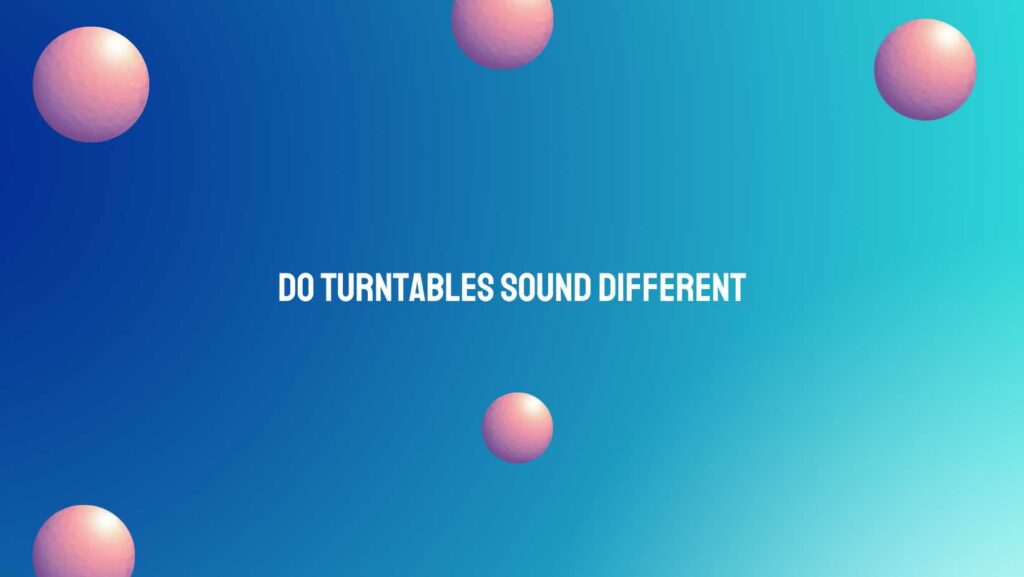In the world of audio enthusiasts, the debate over turntables and sound quality is a subject of perennial fascination. Audiophiles have long debated whether investing in high-end, expensive turntables yields a noticeable improvement in sound quality over their more affordable counterparts. While the answer might seem straightforward, the world of audio is anything but simple. This article seeks to delve into the heart of the matter and explore the intricacies of turntables and their impact on sound quality.
Understanding the Turntable
Before diving into the debate, let’s first understand what a turntable is and its fundamental components. A turntable, also known as a record player or phonograph, is a device used to play vinyl records. It consists of several key components:
- The Plinth: The base or platform on which the entire turntable is mounted. It provides stability and isolates the turntable from external vibrations.
- The Platter: The spinning surface on which the vinyl record rests. It needs to be well-balanced and have a low level of resonance to prevent sound quality degradation.
- The Tonearm: This arm holds the cartridge and stylus (needle) and is responsible for tracking the grooves on the vinyl. The quality of the tonearm and its tracking abilities significantly affect sound quality.
- The Cartridge: This tiny device converts the mechanical vibrations from the stylus into electrical signals, which are then sent to the phono preamp.
- The Phono Preamp: This component amplifies the weak signal from the cartridge, applying the RIAA equalization curve, and prepares it for the amplifier or receiver.
- The Drive System: Turntables can have different drive systems, including belt-drive and direct-drive. The drive system can influence speed stability and vibration isolation.
The Great Debate
The debate about whether better turntables sound better centers on two opposing camps. On one side are those who argue that high-end turntables with premium components can indeed produce superior audio quality. They point to the precision engineering, improved vibration control, and higher-quality components as factors that can lead to a more faithful and detailed sound reproduction.
On the other side are those who claim that, beyond a certain price point, the law of diminishing returns comes into play. In their view, mid-range turntables offer excellent performance at a fraction of the cost of their high-end counterparts. They argue that the human ear may not discern the subtle nuances that premium turntables promise, making the added expense unjustifiable.
Key Factors Influencing Sound Quality
To make an informed judgment on whether better turntables sound better, it’s essential to consider the following factors that influence sound quality:
- Cartridge and Stylus Quality: The cartridge and stylus are arguably the most critical components in a turntable’s sound chain. High-end turntables often come equipped with superior cartridges that can extract more detail and nuance from vinyl records.
- Vibration Control: The plinth, platter, and tonearm play crucial roles in controlling vibrations. Premium turntables often feature advanced materials and construction techniques that reduce vibrations and resonance, resulting in a cleaner sound.
- Precision Engineering: High-end turntables are meticulously engineered to ensure consistent speed accuracy and low wow and flutter (variation in speed). This precision contributes to a more stable and accurate sound.
- Build Quality: High-quality materials and craftsmanship can lead to a more robust and long-lasting turntable, which can maintain its performance over time.
- Phono Preamp: The quality of the phono preamp can significantly impact sound quality. A dedicated, high-quality phono preamp can reveal more of the recording’s detail.
- System Synergy: The performance of a turntable is influenced by its synergy with the rest of the audio system, including the amplifier, speakers, and room acoustics.
So, do better turntables sound better? The answer is not a simple “yes” or “no.” It depends on various factors, including the listener’s preferences, the quality of the rest of the audio system, and budget considerations. High-end turntables undoubtedly offer improvements in several aspects of sound quality, but the magnitude of these improvements can be subjective and may not be noticeable to all listeners.
Ultimately, the debate over turntables and sound quality is a testament to the nuanced nature of audio appreciation. Audiophiles are driven by their passion for sound and their pursuit of perfection, and for many, investing in a high-end turntable is a way to reach that elusive pinnacle of sonic nirvana. However, those seeking to enter the world of vinyl should remember that sound quality isn’t solely determined by the price tag of a turntable. Careful consideration of all components and their synergy is key to achieving a satisfying listening experience.


